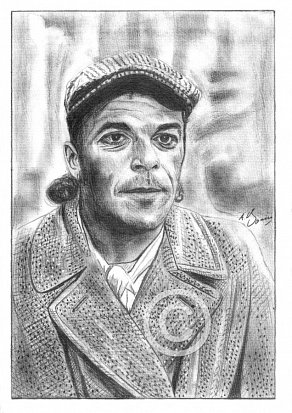Ian Dury
Pencil Portrait by Antonio Bosano.

Shopping Basket
The quality of the prints are at a much higher level compared to the image shown on the left.
Order
A3 Pencil Print-Price £45.00-Purchase
A4 Pencil Print-Price £30.00-Purchase
*Limited edition run of 250 prints only*
All Pencil Prints are printed on the finest Bockingford Somerset Velvet 255 gsm paper.
P&P is not included in the above prices.



Comments
Ian Dury’s death, at the age of 57 with liver cancer, robbed Britain of one of its greatest irreverent wits. One of England’s most beloved musical figures, Dury combined a poet’s flair for language with Cockney humor and a love for the trappings of old-time British music hall. Though he initially gained fame as part of the original British punk movement, his engaging wit and bawdy persona soon endeared him to Britons of all ages and persuasions.
Afflicted with polio at the age of seven, which left him with a shriveled hand and leg, he fell in love with American rock & roll in the late Fifties, but didn’t begin writing songs or performing until over a decade later, while he was employed as a lecturer at Canterbury Art College. His first band, Kilburn and the High Roads, gained a solid reputation on the British pub rock circuit, but broke up in 1975 after recording two poorly received albums. After a year spent gigging with various lineups as Ian Dury and the Kilburns, he found a home at Stiff Records, a newly minted punk imprint which had recently released singles by Nick Lowe, the Damned, and Elvis Costello. “New Boots and Panties,” his first album for Stiff, was a surprise smash; rising to No. 5 on the UK albums chart. I could never personally associate him with the punk era, for the man was just too inherently melodic.
With his ever-present sideburns, drapecoat and walking stick, Dury resembled an erudite cross between a teddy boy and Long John Silver. Though he wasn’t much of a singer, he didn’t need to be since he was able to convey his refreshingly frank ruminations on sex, petty crime, and working-class existence with endearingly gravel-throated charm. By the late Eighties, when his music had fallen from commercial favor, his immense personal popularity enabled him forge a lucrative career as an actor on British television. He also appeared in such films as Roman Polanski’s “Pirates” and Peter Greenaway’s “The Cook, the Thief, His Wife and Her Lover.”
A tireless UNICEF campaigner, Dury also worked closely with several cancer and polio charities, spending what free time he had with disabled and mentally ill individuals. Irrepressible to the end, Dury regarded death with the same good-humored equanimity that he brought to the rest of his life. “If the world by some quirk of nuclear impotency should survive,” he wrote in 1982, “I for one will definitely feel the urge to dress up and dance about.”
Many of Ian’s admirers like Sir Paul McCartney would include him within that elitist group immortalised in his song “There Ain’t Half Been Some Clever Bastards.” Sadly, ill health would deny him the tag “lucky bleeder.”